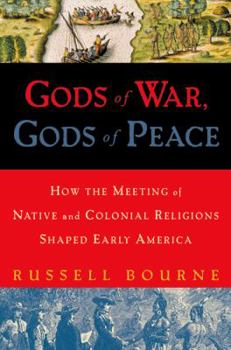Gods of War, Gods of Peace: How the Meeting of Native and Colonial Religions Shaped Early America
Through dramatic comparisons of Native American and early colonial politics, history, and religion, historian Russell Bourne offers a complete and insightful look at how these two disparate groups... This description may be from another edition of this product.
Format:Hardcover
Language:English
ISBN:015100501X
ISBN13:9780151005017
Release Date:April 2002
Publisher:Houghton Mifflin
Length:448 Pages
Weight:1.75 lbs.
Dimensions:1.4" x 6.1" x 9.6"
Customer Reviews
1 rating
A Fine Overview of an Interesting Subject
Published by Thriftbooks.com User , 21 years ago
Russell Bourne's book is an excellent read, and a fine introduction to the complex subject he addresses. I especially appreciate the new perspective it gave me on the New England I've lived in much of my life. Place names that have been merely interesting are now much more meaningful.Bourne's notion - that the conflict between the European and Native peoples beginning in the 1600's is essentially a religious conflict of spiritual orientation - is an interesting perspective on very inteteresting times. It is a worthy discussion, indeed. One thing I found somewhat disturbing was the superficial knowledge he displays with regard to the Puritans. It seemed to me that he might well have read a good deal about them but not read their works, or at least not read them in depth. His take on Jonathan Edwards and David Brainerd in particular seemed pointedly dismissive, and that simply does not do them justice. It would have been been well to illustrate more fully that European spirituality was not all of a kind and that Native spirituality (also not all of a kind) was often in tune with several streams of theology that made the trip across the Atlantic. He correctly points out that there were not mass conversions, one way or another, but it would have been great to illustrate how the evolution of streams of spirituality on each side influenced both cultures.One other point that bothered me was how he tended to lump together things a little study would have shown do not belong together. Charles Finney cannot be considered in the same camp as the Puritans - Finney's theology was heretical on too many points - and the Mormon faith bears no resemblance to the Puritan orthodoxy of New England, nor, in fact, any flavor of Christian orthodoxy. Finney's theology represents a stream of thought that is distinctive for the centrality of subjective experience, and gave birth to a kind of revivalism that the Puritans would have found completely abhorrant. The Mormon faith elevates another book to the place of the Bible, and that would also have been abhorrant to the Puritans of an earlier generation. The point here is that Bourne tends to treat these streams of spirituality as equally "Christian" which they plainly cannot be. The fact that they are not actually STRENGTHENS Bourne's thesis, and I wish they had been treated with a little more depth.Still, this is a very fine work. I found it thought provoking and educational. The section on Hiawatha was particularly enlightening. I actually went back and re-read that section a number of times to be sure I understood it. The book also spurred me to want to understand the origins of my own New England culture with some depth. I recommend the book highly.





